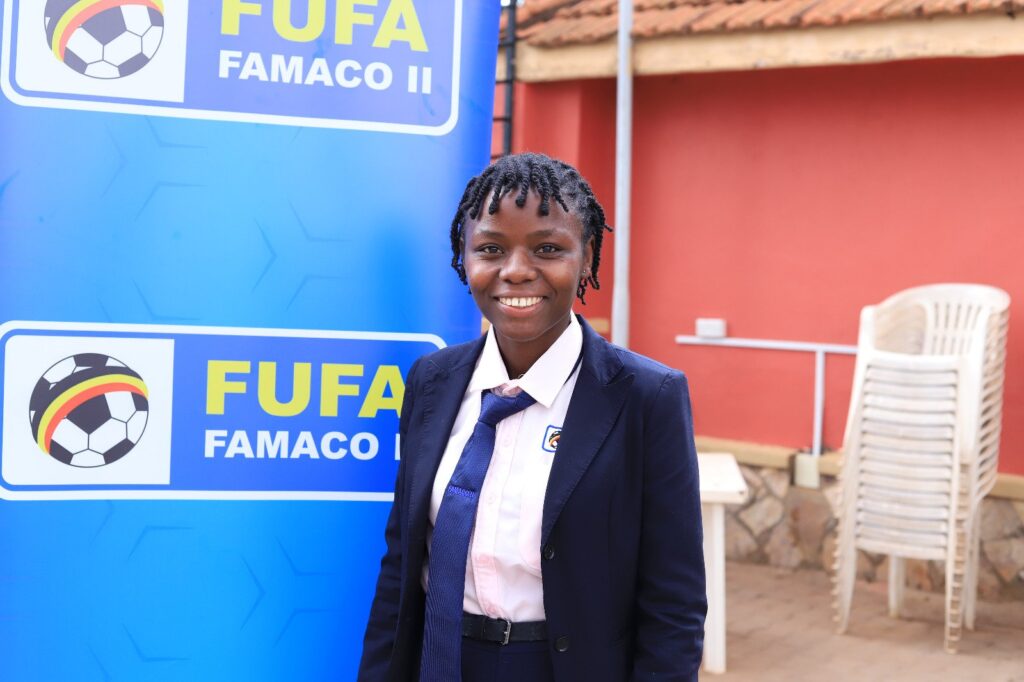By Michael Ainomugisha
Introduction to football for Uganda Christian University (UCU) Lady Cardinals Women’s Football Club’s first female CEO, Mercy Nabulobi, was as organic as it was unintentional. Growing up in Mbale, surrounded by cousins and brothers, football became a natural part of her daily life.
“Honestly, I don’t really have an answer as to what drew me to football,” she admits, reflecting on her early days. “I started playing football just for fun at home. We had a pitch so close to home, and I just found myself playing football.”
It wasn’t until after her senior six that football began to take on a more serious role in her life.
“I was at this tournament [known as Mama Baker], and there was a player and then classmate named Bridget Nabisaru, who introduced me to the coaches at UCU because she lived near the institution in Mukono. They observed me perform and told me that after Form Six, I could attend UCU.”
A few weeks later, Nabulobi was invited to the UCU campus, where she received her first football license in December 2015. Although she was signed to the club, she didn’t play immediately. Her official journey with the UCU Lady Cardinals truly began in 2016, during her vacation. She would eventually move from the pitch to the boardroom as the CEO of the very team she once played for.
Key highlights as a Lady Cardinal
Looking back, Nabulobi says, “My key highlights in my football career came at times when I was granted opportunities to lead.” She started as a regular player, but soon earned her leadership roles within the team. “I was one of the captains for the team for some time, and later I was given the opportunity to also be a coach player for a few years.” These roles laid the foundation for her leadership journey.
Nabulobi has many cherished memories. “Being able to help the team win the FUFA Women Elite League in 2019 and the Uganda Women’s Cup in 2018 are some of the key highlights of my career,” she recalls with pride.
Her leadership extended beyond national competitions to regional university games, where she played a role in securing multiple trophies for UCU.
Challenges as a player
Balancing her academic responsibilities with her football career was something she needed to do carefully, Nabulobi says, “When I had class and training, I adjusted my schedule. If I had morning training and a class at 8am, I would shift my gym work to an earlier time so that I could be on time for class.”
Nabulobi also credits her supportive friends and understanding lecturers. “I was fortunate to have friends who were good in class and helped me catch up on missed work,” she says. “My lecturers were understanding as well. When I had a class that conflicted with a training session, they would sometimes allow me to miss the class or shift it to accommodate my training schedule.”
But not all was smooth. “There were moments when my academic responsibilities conflicted with my football career,” Nabulobi recalls. “For example, there was a time when I had a game, and the lecturer refused to change a test date. I had to stay behind and miss the game, which was a tough decision because I did not pass the test and my team drew in that game as well.”
Player to CEO transition
Transitioning from player to CEO was a significant shift for this former player. She acknowledges that while her previous relationships with the team facilitated her understanding of their needs, it also posed challenges.
“I had always been a friend to every teammate, creating an environment where everyone could approach me. As CEO, the players were used to me, but it also affected the transition negatively because they saw me as their fellow player,” she says.
“Some players took time to acknowledge that I was now their CEO and not just a teammate,” she admits. “It was difficult to implement changes because they still saw me as the player who used to crack jokes and not as a leader.”
She then decided to use her experience as a player to navigate her new role. “Being a part of the team and being a player just like them, it was easy for me to feel what they were feeling and to understand their issues,” she says. “Handling administrative issues was easier because I knew exactly what the players wanted and what was good for them.”
Challenges as CEO and the future
Being a female CEO in a male-dominated sport presented its own set of challenges. Nabulobi faced scepticism from those who doubted her. “They believed that a female CEO couldn’t make strong decisions, but I knew my knowledge of football was solid,” she stresses. But, she says, she has found strength in her role. “Being a female CEO in women’s football is actually an advantage,” she explains. “I understand the players better because I can relate to their experiences. My role allows me to inspire and empower other women in football to pursue leadership roles.”
She now uses her position to encourage young women to pursue leadership roles in football. “I use my platform as CEO to talk to players individually and in groups,” she shares. “I encourage them to pursue leadership roles and to see themselves as capable leaders. I also point them to other role models in the field to show them what is possible.”
She envisions a future filled with growth and continued dedication to football administration. “In the next five years, I want to gain as much experience as possible and devote my career to football administration,” she says. “I see myself taking on even bigger roles and continuing to contribute to the sport I love.”


